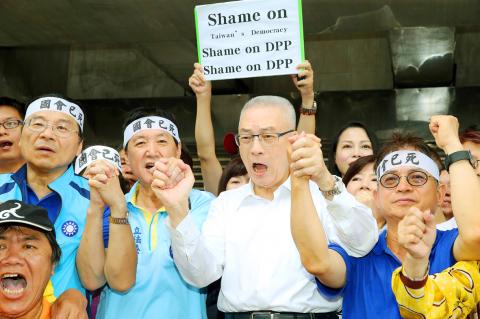Chinese Nationalist Party (KMT) legislators Lai Shyh-bao (賴士葆), Alex Fai (費鴻泰) and William Tseng (曾銘宗) yesterday continued their hunger strike in protest against what they said was the Democratic Progressive Party’s (DPP) “autocratic” handling of the motions tendered by opposition lawmakers for the Forward-looking Infrastructure Development Program.
The lawmakers started their hunger strike at 8pm on Tuesday after Legislative Speaker Su Jia-chyuan (蘇嘉全), a DPP member, announced that there would be no voting on the same issue twice.
The KMT caucus said that if the rule of no voting twice on the same issue were followed, only the 101 motions tendered by the DPP, which controls the legislature, would be voted on, while motions filed by other caucuses would be ditched, which would be undemocratic and against the law.

Photo: CNA
Sitting on the stairs at the side entrance of the Legislative Yuan in Taipei, the three men vowed to fast for 50 hours until the extraordinary session ends today, drinking only water as sustenance.
“How will we end up as after 50 hours? I dare not say, but I hope that we can raise people’s awareness that this country is gradually becoming a dictatorship, that it is becoming like Germany under Hitler,” Lai said.
“Have you seen Legislative Speaker Su Jia-chyuan’s bossy attitude? He thinks that just because he has a bigger fist, he can hit his opponents down,” Lai said, referring to the DPP’s legislative majority.
Former legislative speaker Wang Jin-pyng (王金平) and former Taipei County commissioner Chou Hsi-wei (周錫瑋), members of the KMT, yesterday visited the three lawmakers and expressed their solidarity with them.
“The DPP’s assertion that ‘the same issue should not be voted on twice’ is based on distorted interpretations of the legislative procedure provided by Su’s aides,” Wang said.
“It will allow the budget to be arbitrarily pushed through with a majority vote,” he said, adding that Su’s handling of the proceedings would likely have repercussions on the legislature’s future operations.
Chou urged the DPP to contemplate whether doling out such large sums for the infrastructure program would really help boost the nation’s competitiveness and economic growth.
“If DPP lawmakers force the budget through with its [majority] vote, the public will decide through the ballot box whether to allow the DPP to remain in power,” Chou said.
KMT Chairman Wu Den-yih (吳敦義) on Tuesday night visited the three lawmakers, saying that he “sympathizes with them and supports their hunger strike.”
Su said he respects Wang as a veteran politician, but asked whether Wang spoke according to his conscience.
The way legislative motions are addressed was approved by officials at the legislature’s Conference Department based on practices with which the KMT dealt with motions when it held the legislative majority, Su said.
Meanwhile, DPP Legislator Wang Ding-yu (王定宇) mocked Tseng for saying he was ready to risk “self-injury” by not eating for five hours.
Tseng made the remark when he went live on Facebook on Tuesday night before starting the hunger strike.
“I never knew that not eating for five hours is a form of self-injury. It just occurred to me that I have been inflicting harm on myself for more than 40 years,” Wang said on Facebook.

Beijing could eventually see a full amphibious invasion of Taiwan as the only "prudent" way to bring about unification, the US Department of Defense said in a newly released annual report to Congress. The Pentagon's "Annual Report to Congress: Military and Security Developments Involving the People's Republic of China 2025," was in many ways similar to last year’s report but reorganized the analysis of the options China has to take over Taiwan. Generally, according to the report, Chinese leaders view the People's Liberation Army's (PLA) capabilities for a Taiwan campaign as improving, but they remain uncertain about its readiness to successfully seize

Taiwan is getting a day off on Christmas for the first time in 25 years. The change comes after opposition parties passed a law earlier this year to add or restore five public holidays, including Constitution Day, which falls on today, Dec. 25. The day marks the 1947 adoption of the constitution of the Republic of China, as the government in Taipei is formally known. Back then the Chinese Nationalist Party (KMT) governed China from Nanjing. When the KMT, now an opposition party in Taiwan, passed the legislation on holidays, it said that they would help “commemorate the history of national development.” That

Taiwan has overtaken South Korea this year in per capita income for the first time in 23 years, IMF data showed. Per capita income is a nation’s GDP divided by the total population, used to compare average wealth levels across countries. Taiwan also beat Japan this year on per capita income, after surpassing it for the first time last year, US magazine Newsweek reported yesterday. Across Asia, Taiwan ranked fourth for per capita income at US$37,827 this year due to sustained economic growth, the report said. In the top three spots were Singapore, Macau and Hong Kong, it said. South

Snow fell on Yushan (Jade Mountain, 玉山) yesterday morning as a continental cold air mass sent temperatures below freezing on Taiwan’s tallest peak, the Central Weather Administration (CWA) said. Snowflakes were seen on Yushan’s north peak from 6:28am to 6:38am, but they did not fully cover the ground and no accumulation was recorded, the CWA said. As of 7:42am, the lowest temperature recorded across Taiwan was minus-5.5°C at Yushan’s Fengkou observatory and minus-4.7°C at the Yushan observatory, CWA data showed. On Hehuanshan (合歡山) in Nantou County, a low of 1.3°C was recorded at 6:39pm, when ice pellets fell at Songsyue Lodge (松雪樓), a